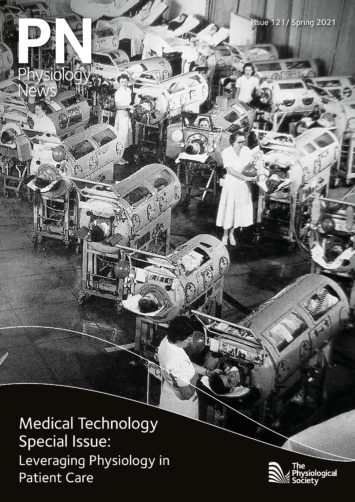
Physiology News Magazine
Policy Focus: Ensuring a funding environment that reflects the impact of physiology
News and Views
Policy Focus: Ensuring a funding environment that reflects the impact of physiology
News and Views
Tom Addison, Policy Manager, The Physiological Society
https://doi.org/10.36866/pn.121.8
The recent announcement of a review of the Research Excellence Framework (REF), implementation of the Knowledge Exchange Framework (KEF) and the UK Government commitments to increase UK science funding mean that research funding is under unprecedented scrutiny by the UK Government and funding organisations. To ensure a healthy funding landscape for physiology, The Society has been working with policymakers, industry, UKRI and higher education institutions to champion the benefits physiological research brings the economy and wider society.
Firstly, towards the end of January, The Society launched its joint report with the National Centre for Universities and Business (NCUB) Translating Knowledge and Research into Impact: Physiology and knowledge exchange. This project’s Advisory Group was co-chaired by members Professor Tim Curtis from Queen’s University Belfast and Dr Richard Siow from King’s College London and included participation from representatives of AstraZeneca, GlaxoSmithKline and PraxisAuril. Knowledge exchange, as the report notes, describes the multiple interactions between higher education institutions and businesses, public services, charities, the public, policymakers and Government that create societal and economic benefit and account for about £5 billion of the UK’s academic sector.
While universities are required to declare their knowledge exchange income and break it down roughly into different academic sectors (bioscience, law, humanities etc.), a comprehensive discipline-specific approach to analysing these data has never been undertaken.
In doing so, The Society will give funders and policymakers a better idea of the type of financial and social contribution that physiology makes and also demonstrate the breadth of physiological research’s impact. For example, one knowledge exchange team found that physiological research conducted at their institution had been cited as evidence in a legal case.
Additionally, the report seeks to better understand the types of knowledge exchange that physiologists undertake and why. For many years, the prevailing view among some was that knowledge exchange only meant commercialisation and licensing and that was only undertaken for an individual researcher’s financial benefit. In truth, our report found that commercialisation of research makes up a small proportion of overall physiological knowledge exchange (about 7% of the universities that provided data) and seeking one’s own fortune ranked as the least popular driver of knowledge exchange activity (about 13%). Physiologists were more likely to use knowledge exchange as an opportunity to inspire new research (55%), to translate their research into a benefit (42%) or to further their institution’s outreach mission (42%). Knowledge exchange then, is not just about the money but the financial data help us to make an evidenced-based argument for the return on investment of public funds.
This report includes input from over 250 stakeholders from across physiology: university knowledge exchange teams, industry partners and organisations that support collaboration between them. The report launch reflected this, with opening remarks from the Chief Executive Officer of BBSRC, Professor Melanie Welham, as well as remarks from some of our Advisory Group members from organisations such as NCUB, GlaxoSmithKline and King’s College London. To read the report and watch the recording of the launch event, please visit physoc.org/ knowledge-exchange.
Secondly, The Society held a joint roundtable workshop with the Campaign for Science & Engineering (CaSE) on barriers to greater interdisciplinary funding and working along with senior management from universities and other learned societies and membership organisations. This wide-ranging discussion touched on several recommendations that The Society outlined in Growing Older, Better, particularly on the challenges of writing grant applications that appeal to the expertise of multiple funding panels. A summary report from the session can be downloaded from physoc.org/interdisciplinary
A final example of one of the ways The Society’s policy work has impact is the Lords Science and Technology Committee’s long-awaited report into the UK Government’s approach to meeting the challenges of an ageing society, Ageing: Science, Technology and Healthy Living. In places, the Lords report quotes directly from The Society’s 2019 report Growing Older, Better around the need for greater urgency in reaching the Government’s Ageing Society Grand Challenge of an average increase of ”five healthier, more independent years of life by 2035”1 and the need to underpin this ambition with a better understanding of the mechanisms of ageing and age-related diseases.
As the activities described above outline, The Physiological Society will continue to look for opportunities to make the case for improved funding processes for physiology. The publication of Translating Knowledge and Research into Impact is timely given the introduction of the KEF this year and with the announcement that the REF criteria will be reviewed after this year’s cycle, there is again an opportunity to make the case for a greater focus on interdisciplinary research such as physiology.
In the meantime, there is an opportunity to read the report at physoc.org/knowledge-exchange and share the report with your colleagues.
References
- https://www.ukri.org/wp-content/uploads/2020/11/ UKRI-131120-SocialInvestmentReport-V2.pdf
